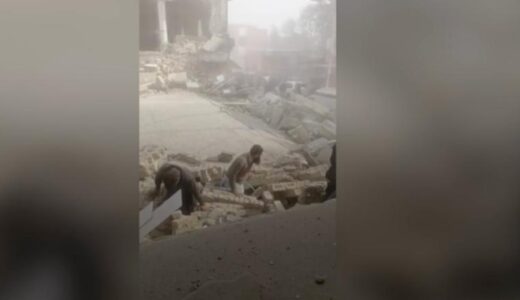
Is Isis to blame for the Pakistan mosque bombing?
The Islamic State may have been driven out of its capitals in Iraq’s Mosul and Syria’s Raqqa but that doesn’t mean it has disappeared. In the Philippines, West Africa, and most obviously in Afghanistan, the terror group is thriving. Isis’s tentacles have also spread to Pakistan.
Over the weekend, in Peshawar, a terrible bombing took place in a mosque. At least 95 are dead, and hundreds have been injured. It remains unclear who is to blame for this atrocity, but, tragically, it is not the first time a place of worship has been targeted. In March 2022, the Afghan detachment of Isis bombed a Shia Mosque in Peshawar. More than 60 people were killed in that attack and nearly 200 injured.
In Pakistan, as in other countries where Isis has support, weak governments, a general tide of violence and the state sponsorship of other armed groups have created a witches’ brew ideal for the terror group to take root in. In chaos, Isis thrives, and into chaos it almost always steps.
The Pakistani Taliban initially claimed responsibility for the bombing, but this was later denied by the militant group, which blamed it on a splinter faction.
Whoever is to blame, whether the Taliban, Isis, or another offshoot, these attacks are sadly and increasingly commonplace: religious services bring crowds and collections of people who Isis’s exclusionary Salafi theology drives them to despise. Congregations make easy and frequent targets.
At the root of the problem lies the collapse of Afghanistan. It is here that Isis has resurged and been building its strength, biding its time for more than half a decade.
Since the collapse of the internationally recognised government in September 2021, the Taliban has failed at governing and pacifying Afghanistan. Mosques are bombed by Isis almost every week. Famous clerics are assassinated, civilians – especially from ethnic minorities – are terrorised, and in response the Taliban has found itself increasingly helpless.
These sorts of things spill over into neighbouring countries. It’s hard for them not to, given the nature of this violence, designed as it is to spread fear, terror and more violence in turn.
Pakistan borders Afghanistan and shares many of its geopolitical problems and causes. Some of these issues trace back to the Pakistani army and its Inter-Service Intelligence (ISI), which founded and funded the Taliban in the mid-1990s. The ISI went on to support the terrorist group until and after it took Kabul in 2021 and meanwhile sheltered Osama bin Laden in Abbottabad, a Pakistani garrison town, until he was found and killed by the Americans in May 2011.
Just as the Taliban struggles against Isis, so too does its Pakistani sponsor. The problem is that terrorism generates more terrorism, much like lawless entities fail to hold up the law.
For two decades, the Taliban was the major terrorist force in Afghanistan. It bombed mosques and government buildings. It assassinated religious leaders and ministers. As society became more militarised and bloodied, it forced both its enemies and friends to acquire weapons and the will to use them.
Poachers can turn gamekeepers, but very few terrorists can turn into governors. So it has proved with the Taliban. Western observers – as if to delude themselves into moral rightness – insisted for years that the Taliban had moderate factions who would take over when they assumed power. This would happen either through a coalition agreement or through a squalid deal, the sort of which we eventually saw in Doha in 2020.
Instead this did not happen, and the terrorist, exclusionary version of the Taliban is in power. The cuddly, capable ones never showed up. Afghan society is permanently unstable and still on a war footing – poor, chaotic and hopeless. And that would be true even without Isis around.
But Isis is around, and its members have ranged themselves against the Taliban quite effectively. The Taliban created the space for violent insurgency and now Isis is filling it. Isis leaders say the Taliban are cowards and sell-outs too beholden to foreigners like Pakistan and the United States (with whom the Taliban has de facto diplomatic relations).
Isis says that it alone can sustain the violence and the brutal religion necessary to take care of the demand the Taliban itself created. Just as the Afghan government was bedevilled by the Taliban, so now the Taliban is bedevilled by Isis, which copies – with a sicker twist – many of its own activities of decades standing.
The civil fabric that the Taliban could never rebuild has been further torn to shreds by Isis. Sadly for Pakistan’s military, the violence it hoped to contain alongside Afghanistan cannot be contained.
Weapons saturate the region and find their way via radical theology to the most extreme of the available armed groups; the ones who show the most brutality often end up on top. For decades, that group was the Taliban, and now it is Isis.
In Afghanistan’s case, the Taliban successfully destroyed the internationally-recognised government. And it has created a social and military void into which Isis – and all its attendant evils – have happily stepped. The civilians of Pakistan are now suffering the consequences already, completely unnecessarily, felt by the abandoned people of Afghanistan.
Source: spectator





